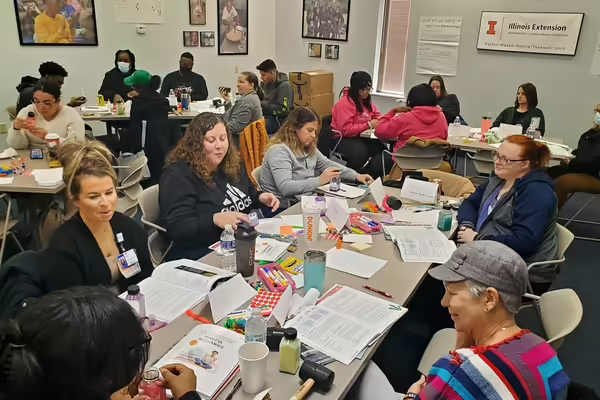
PEORIA, Ill. - The need for education and support around youth mental health is an unfortunate reality. Statistics show mental health disorders and suicidal behaviors are rising among young people. This topic was a repeated area of concern addressed by both youth and adults during focus group discussions held by the Peoria Youth Wellness Community Partnership (PYWCP) comprised of nine local partners.
As key facilitators of the PYWCP, University of Illinois Extension 4-H Youth Development Educators Judy Schmidt and Emily Schoenfelder used their expertise to help address this vital concern. The duo taught a youth wellness workshop to afterschool providers and directly to a group of teens.
In January 2023, twenty afterschool providers representing fifteen different agencies attended the hands-on training where they experienced two 4-H curricula, Mindful Mechanics and Your Thoughts Matter. With funding provided by Illinois 4-H, participants received training, curriculum, and materials to implement the lessons at their sites. One hundred percent of the participants stated that they learned more about mental, emotional, and social health and planned to implement what they learned. Their estimated reach is 360 youth.
In conjunction with the training, a pilot of Mindful Mechanics was conducted with fifteen youth in the Teen Reach afterschool program at Harold B. Dawson School. Youth participated in a series of six lessons including yoga, stress management, emotions, positive affirmations, quiet listening, and mindfulness. Youth reported learning the most about their emotions and how to shift their feelings if they wanted to stop feeling a certain emotion. Staff at that program shared that youth were better able to identify emotions and calm themselves.
The National Institute of Health reports that nearly 20% of people ages 3-17 in the United States have a mental, emotional, developmental, or behavioral disorder. Additionally, suicidal behaviors among high school students increased by more than 40% from 2009 to 2019.
“These trends were intensified during the COVID-19 pandemic,” Schmidt noted. “As teens transition from adolescence to adulthood, they encounter additional stressors that can significantly impact their well-being. The 4-H program provides a wide range of activities and safe, caring adult volunteers that indirectly support youth and their overall health. We are also working to more directly support youth and area educators to equip them with the skills and support to help with youth mental and emotional health.”
The prevalence of mental health disorders, such as anxiety and depression, has been on the rise even more steeply in the year following the pandemic, emphasizing the urgent need to address the mental health needs of young adults.
“One of the outcomes we hope will be achieved by the pilot program and the broader afterschool staff training is to help equip youth with the skills and support to manage their emotions, navigate relationships, and make healthy decisions,” Schmidt concluded.
Photo caption
Calming glitter jars was one of the hands-on activities U of I Extension 4-H youth educators incorporated into the Youth Wellness Workshop held for local afterschool providers. The need for more direct education related to youth mental health is being addressed by the local 4-H youth development program.
Illinois Extension leads public outreach for University of Illinois by translating research into action plans that allow Illinois families, businesses, and community leaders to solve problems, make informed decisions, and adapt to changes and opportunities. Illinois Extension is part of the University of Illinois Urbana-Champaign College of Agricultural, Consumer and Environmental Sciences.